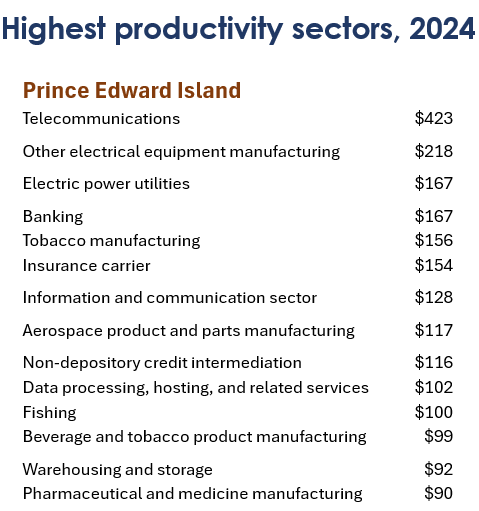I have probably studied the structure of the economy in Atlantic Canada more than just about anyone else in recent years, and one of the bedevilling challenges is how to create truly high value industrial activity in the region. By high value I mean industries that pay high wages and, ideally, other significant sources of tax/royalty revenue.
If you look across Canada, the only provinces that have gone from a ‘have-not’ to a ‘have’ status (i.e. not requiring federal Equalization payments) are the provinces that have literally struck oil (and gas) including Saskatchewan and Newfoundland and Labrador. Old Jed Clampett shot his gun and up from the ground came a bubblin’ crude.
Since that is essentially not possible on PEI, we have to look for other sources of ‘oil’.
In many ways, PEI has done a lot of good things in recent years. It has developed the largest tourism industry in the country (as a share of GDP). It has developed its natural resources into the largest food economy in the country (fish, farming, value-added manufacturing, tourism, etc.). Against the odds, it has developed a biosciences cluster that is considerably larger as a share of GDP than anywhere else in Canada. It converted a former CFB into an interesting aerospace industry. PEI was first out of the gate in Atlantic Canada to take the demographic challenge seriously.
PEI has led the country in private sector GDP growth over the past five years.
The PEI provincial government leads the country in economic development spending per capita. A province with a population the size of the Moncton CMA has an economic development department with over 100 staff. The government has developed innovative incentive programs and invested in a lot of economic development infrastructure.
And, yet, the Island economy still has among the lowest GDP per capita in North America (among the 50 US states and 10 Canadian provinces).
PEI’s corporate income tax rate is double the rate in Alberta. It’s personal income tax rates and sales tax rates are higher than most other provinces. And, even though it is a tiny province, spending on public services is not significantly higher than other provinces (no gold-plated public services). As an example, per capita provincial government program spending is only 7% higher in PEI than Saskatchewan.
And yet, PEI requires the most equalization (basically the same as NB and only slightly more than NS).
Essentially PEI is doing an admirable job with economic development and population growth but it doesn’t have oil and gas. It doesn’t have critical minerals. It doesn’t have Bay Street. On a GDP per capita basis, PEI leads the country in fishing, food manufacturing, accommodation services, aquaculture, pharmaceutical manufacturing. All vitally important industries but for the most part not high value industries.
As I have said before “you dance with the girl you took to the prom”. PEI is doing the best it can with the assets it has but are there opportunities to push up the value chain?
These are Alberta’s highest productivity sectors measured as value-added per hour worked.
And these are Prince Edward Island’s:
What stands out to you? Besides telecommunications (which is mostly providing phone and internet services to local clients), the highest value sectors on PEI (as measured by value-added per hour worked) are mostly under $200/hour. In Alberta, nearly the top 20 industries have at least $200/hour productivity. It shouldn’t be lost on you just how many of Alberta’s most productive sectors are directly related to the oil and gas and mining industries. Almost all of them.
So what should places like PEI do? They could try to attract more film and media production but BC and AB have used oil and gas revenues to develop aggressive incentives to attract film production. They could try and grow the IT sector but face stiff competition from Ontario and Quebec (particularly around digital media). They could do something radical like become the Bermuda of Canada and attract high value financial sector activity but then would incur the wrath of Ontario.
Now we are going whole hog on freeing up interprovincial trade and the Island’s professional services and other locally-focused industries (which have been modestly coddled) will likely face more competition from beyond the Confederation Bridge.
I’ve come to the conclusion that all Canadian provinces should be expected to do the best job they can developing the assets and attributes they have to foster a strong economy. I think PEI is a good example of this. However, as a country we have a Constitution that says all Canadians should have good access to quality public services no matter where they live.
So we expect everyone to develop their economies in good faith We don’t stand in the way of a small province as it starts to develop industries even if that means some interprovincial investment flows. The richer provinces should not use their excess wealth to create an unlevel playing field for economic development (too late, companies in Alberta face a much lower tax environment than PEI).
And then we use something like the federal equalization program to ensure that a Canadian is a Canadian when it comes to accessing public services.
As for what high value industries could be developed on PEI, the search goes on.








Shocked to see Telecom at the top. There is no telecom "industry" there. Except for a couple of micro operators, the three major telecoms serving the island are based off-island, with combined assets perhaps equivalent to those of the greater Moncton area in scope, and a handful of field technicians. I guess this is more of a sign of how small the economy is and maybe that islanders are paying too much for telecom services :-)